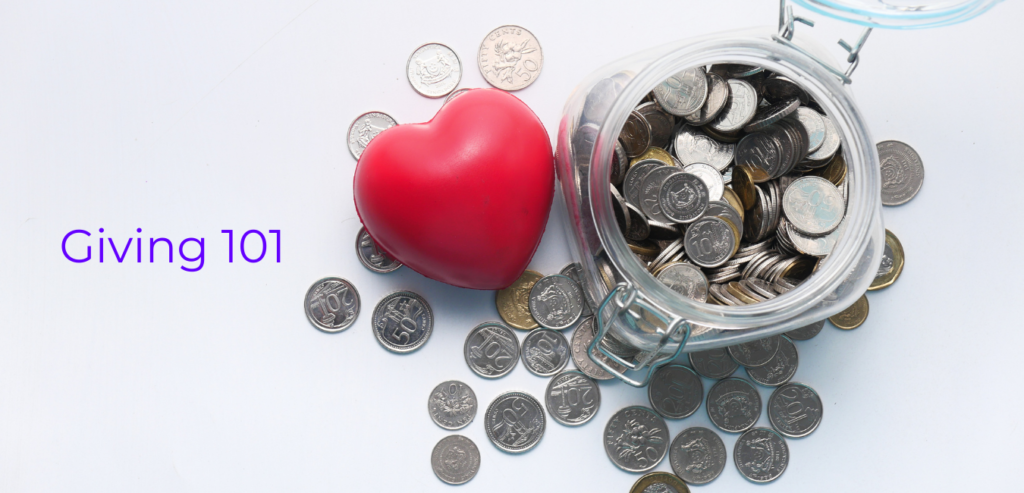Introduction
So you’ve been through every other part of personal finance, and you’re so confident in where your money is going that you’re ready to start giving some of it away – welcome to our Giving 101 Guide! In general, the data shows that more than 80% of Americans donate to charity in a given year. In 2019, $309.6 billion of a total of $449.6 billion donated was given by individuals.
The Benefits of Giving Money
One of the main benefits of giving money to causes that are important to you are the psychological benefits. Research from the Women’s Philanthropy Institute shows that giving is positively associated with increased life satisfaction. Interestingly men and women experience these benefits differently. Women gain more satisfaction based on the percentage of their income they donate, while men experience satisfaction just from the act of giving.
Do You Have a Giving Strategy?
So we know that, as a country, we like to donate to causes we care about. However, the vast majority of those making small donations don’t have a Giving Strategy. Donations are most often a response to a request for money when prompted at a grocery store checkout line, or from an organization they care about. This happens perhaps once or twice a year. However, this piecemeal approach to donation makes it difficult to know where your dollars are going, or ensure you are supporting the causes you care about in a meaningful way.
So what is the “right way” to donate money, and what are the questions you need to ask yourself to figure out what works for you?
How Do I Decide Who to Donate to?
The first place to start, and probably the most personal question here is: which cause or causes to support. There are so many wonderful organizations doing important work. Unfortunately, you only have a limited amount of money you can donate. As such, picking the right cause or causes is crucial. Once you have decided you want to start donating some of your wealth to worthy causes, it’s up to you to determine what those causes are in your eyes.
I Have a Cause Close to My Heart
Some common themes of donations are religion, education, health, human services, and targeted foundations, to name a few. If you have a connection to an organization, such as a church or university, that you wish to give back to, donations are an easy way to do so. In addition, if you have a specific cause that you care greatly about – perhaps homelessness or those suffering from a particular illness, such as ALS – there are often foundations that specifically target particular causes.
I Want to Donate, But I Don’t Have a Cause In Mind
Some have the resources available to donate, but don’t have a specific cause that they wish their donations to be used for. Thankfully, there are resources out there that help direct dollars to institutions and organisations that have been vetted, and are known to use donations efficiently to address problems.
One such resource that we at Ostrich recommend is Give Well. Give Well looks for charities in areas where high impact can be made. The intent of this is to find causes where each incremental dollar saves or improves the most lives possible. One frequent cause that benefits from Give Well’s work is the fight against Malaria.
Check out our Recommended Giving Tools article for more options when it comes to directing your donations.
How Much Should I Donate?
This question is much more mathematically based. After reading our other 101 Guides, you should now be in a place where you have your money working for you towards your goals. You have any debt sorted out, retirement investing set up, and you’re left with a chunk of income beyond your monthly expenses. At this point, you’re ready to decide where Giving sits in your personal goal hierarchy.
Your Goals
You’ll need to weigh how important your personal goals that require your money are, in comparison to how important you believe charitable causes you donate to are.
Are you willing to spend less on that car you’ve always wanted to get, or perhaps wait a little longer for your dream wedding?
For some, prioritising a personal goal will mean choosing not to donate at all. However, for others, delaying achieving a personal goal by one month might mean being able to donate to a cause important to them. As mentioned previously, donating money is linked to increased life satisfaction. Delaying a goal by one month may be well worth that boost you recieve.
Tax Implications
Most charitable deductions are at least partially tax deductible. This is a nice additional benefit to donating to causes you care about, in the form of a lower tax bill at the end of each year! That being said, with the exception of 2020, you do have to itemize your taxes to be able to do this, as opposed to taking the standard deduction. For some, this will mean that it isn’t worthwhile tracking donations for deductions.
For more in depth analysis, take a look at this excellent Nerd Wallet article on the tax implications of charitable deductions.
What’s the Most Efficient Way to Donate?
From a personal perspective, this depends on your goals. If giving is a goal of yours, recurring donations are the best way to ensure that you hit that goal. Most organisations that accept donations are able to facilitate recurring donations through their payment platform. Recurring donations have another advantage, which is that they allow the charity to which you’re donating to better plan their spending based on future revenues.
To take a higher level view, you can think about what the best use of your dollars is. For some, that will be giving back to their alma mater. For others it’s funding research into an illness they or someone they’re close to has experienced. For many, though, there isn’t an obvious personal candidate for donation. As mentioned above, we recommend Give Well in this situation. They do the leg work when it comes to figuring out where your dollars will go furthest, and direct donations for you. They also have several targeted funds if you have an area in mind that you’d like to donate to.
We encourage you to sign up for a giving challenge on Ostrich that fits your giving strategy.
Conclusion
Giving is usually the last thing we think about on the personal finance totem pole. However, that doesn’t mean it’s the least important, or that it doesn’t require proper attention. Once you figure out how much you want to donate, and to whom, set up recurring donations to ensure that you hit your goals. Using Ostrich, you can implement a giving strategy that improves your life satisfaction and provides needed support to the causes you care most about. Always consider the tax implications of your donations, especially if you already itemize your taxes. Finally, think about how your dollars will be used once donated, and make sure that you’re happy with that!














